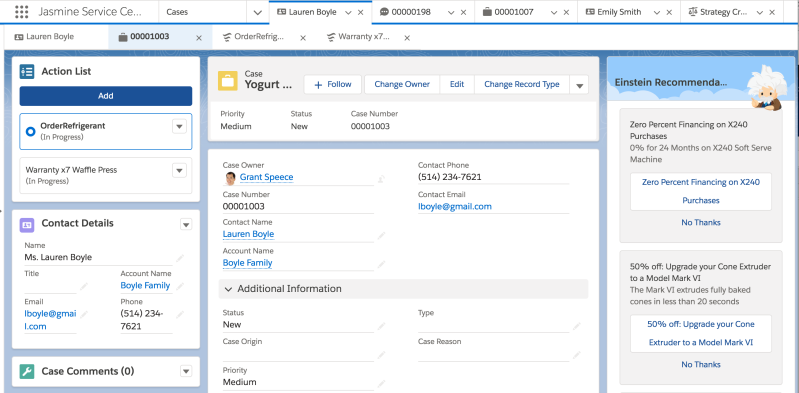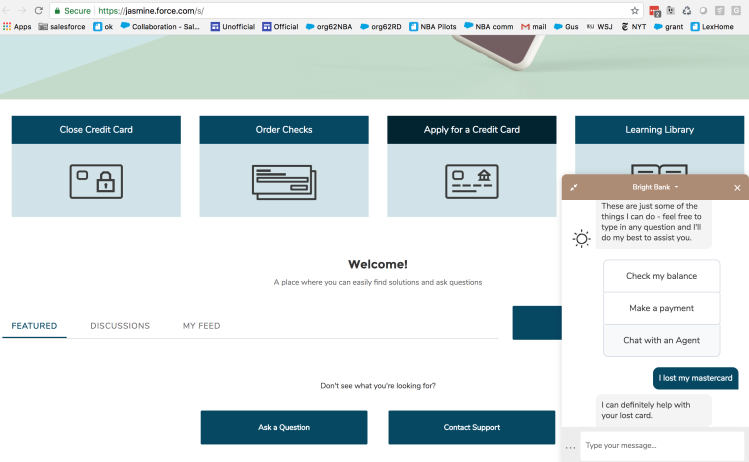Want smarter insights in your inbox? Sign up for our weekly newsletters to get only what matters to enterprise AI, data, and security leaders. Subscribe Now
Salesforce is making its automated Einstein bots generally available for conversations with customers on websites and apps today. Einstein bots and a series of conversational AI services were first introduced for a pilot program last year at Dreamforce.
Process automation tool Lightning Flow, which also debuted at Dreamforce last year, is also being made generally available today.
Einstein bots are launching without a voice input option or ability to share photos or videos, features increasingly common on other bot platforms. In the future, Einstein bots may be available for additional channels, such as SMS messages or Apple’s Business Chat, a company spokesperson told VentureBeat.
Salesforce’s bots are being made available years after companies like Facebook Messenger became smitten with the idea of reshaping interactions between customers and businesses.
AI Scaling Hits Its Limits
Power caps, rising token costs, and inference delays are reshaping enterprise AI. Join our exclusive salon to discover how top teams are:
- Turning energy into a strategic advantage
- Architecting efficient inference for real throughput gains
- Unlocking competitive ROI with sustainable AI systems
Secure your spot to stay ahead: https://bit.ly/4mwGngO
Others now in the space include WhatsApp Business, Android’s RCS messaging, Twitter, Microsoft’s Bing Business Bot Service, and more traditional players like LivePerson or [24]7.ai.
Einstein customer service bots can incorporate intelligence from the Salesforce CRM system and can be programmed to carry out automated conversations or hand off a conversation to a human agent.
Building these chatbots does not require coding, and they are able to handle natural language interactions, as well as buttons or blurbs of text customers can tap or click. Conversations can be managed with Salesforce’s Live Agent chat software or Service Cloud console.
In a handoff, the language recommended to a customer service agent can take into account where the conversation is taking place.
“It is both context-aware and channel-aware, so this is a chat channel — this is not a phone, this is not email, it’s not an interaction on Twitter. This is chat, and that drives the guidance you may give to the agent. You may want to show different flows or variances of these flows in different channels,” Salesforce VP Marco Casalaina told VentureBeat in a phone interview.

Above: Salesforce Service Cloud console with Lightning Flow and Next Best Action on the left and right.
Einstein Agent and Einstein Answers, which also debuted at Dreamforce, are still pilot programs.
Another pilot program underway for Next Best Action provides recommendations in real time during conversations, based on a combination of rules from human managers and predictive machine intelligence.
In addition to being able to guide the actions of customer service agents with bots, Lighting Flows and Next Best Action can be embedded into areas like a website or forums for customer self-service.
With Next Best Action — based on data from a customer and from other customers with similar attributes — Einstein may recommend that a bot or agent take a specific action, like suggesting an upsell or offering a discount or fee waiver to retain a customer. MyEinstein allows the use of out-of-box Einstein solutions or custom AI models.
“There is no standard prediction that we could make for attrition, because everybody defines attrition differently. And so that’s an inherently custom prediction that our customers can now make,” Casalaina said.
The Einstein platform for AI from Salesforce first made its debut in September 2016. Earlier this year, it surpassed 1 billion predictions a day. In total, Einstein now offers 30 AI services, a number that may increase later this year as Dreamforce is scheduled to take place Sept. 25-28 in San Francisco.


